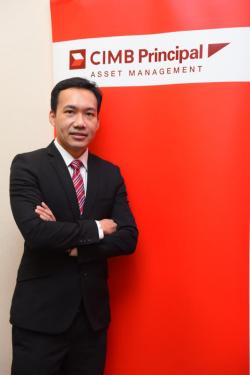
The Thai stock market is set to surpass its January 1994 intra-day all-time high of 1,789 points in 2018 after it surged 10.6% this year to date. The broader economic rebound, the continued growth in exports and tourists, and the general elections -- scheduled for late next year -- are expected to draw foreign investors and buoy local equity.
The National Economic and Social Development Board has forecast GDP growth in the range of 3.6-4.6% next year, while the Bank of Thailand has predicted economic growth at 3.8% -- matching an estimate by the Finance Ministry's Fiscal Policy Office.
Equity is expected by securities analysts and fund managers to be a better investment than bonds or gold next year, when interest is expected to reverse low-rate trends while the firmer US dollar will weigh down on gold prices.
Despite a slew of positive factors, there are some headwinds for the Thai stock market in 2018. These include geopolitical tensions, the US Federal Reserve's balance sheet wind-down and further interest rate hikes, the European Central Bank scaling back bond purchases, and higher inflation, which could prompt the Bank of Thailand's Monetary Policy Committee to start normalising monetary policy.
Below are investment strategies and asset allocation recommendations by analysts and fund managers for 2018.
Kavee Chukitkasem

Kavee Chukitkasem, assistant managing director at Kasikorn Securities
Assistant managing director at Kasikorn Securities (KS)
The country's economic recovery is expected to become broader next year because of state investment sprees and improving private consumption, which could prompt the private sector to invest more. However, the two main drivers for this year -- exports and tourism -- are expected to grow at a slower pace.
"These supporting factors coupled with the continuing low-interest-rate environment will help rev up economic activity. Moreover, the global economic pick-up will bolster Thai equities," he said.
Foreign investors will plough more money into the Thai stock market next year.
Given the inflow from investors, large market-cap shares including banking stocks would be attractive. Bangkok Bank (BBL), TMB Bank (TMB) and Tisco Financial Group Plc (TISCO), a parent of Tisco Bank, are stocks recommended by KS.
The industrial estate sector will benefit from direct investment, to be propelled by the government's Eastern Economic Corridor (EEC), and the brokerage house recommends investors buy Ticon Industrial Connection Plc (TICON) shares.
The broker also recommends buying retail stocks -- CP All Plc (CPALL) and Robinson Department Store Plc (ROBINS) -- and construction laggard plays such as Sino-Thai Engineering and Construction Plc (STEC) and Siam Cement Plc (SCC).
Hospitality and tourism shares are KS's top picks, with Bumrungrad Hospital Plc (BH), Bangkok Dusit Medical Services Plc (BDMS) and Minor International Plc (MINT) given the highest recommendations.
He said the ICT and electronics sectors are likely to underperform next year.
KS forecasts the SET index will hit 1,800 points in 2018.
Win Phromphaet

Win Phromphaet, chief investment officer at CIMB-Principal Asset Management
Chief investment officer at CIMB-Principal Asset Management
Selecting the right asset allocation plan that fits well with investors' risk profile is better and easier than putting effort into guessing which types of assets will perform the best, said Mr Win.
His opinion is supported by research conducted by Financial Analysis Journal, which found that 93% of returns are attributed to asset allocation, 5% from stock selection, and only 2% from timing.
"Good investment portfolios should be diversified into various asset classes and regions because the diversification can help reduce risks when some asset classes or countries underperform," Mr Win said.
CIMB-Principal has five mutual fund asset allocation plans for investors who do not have time to manage their own portfolios in 2018. The plans are based on investor risk profiles.
The extremely conservative allocation plan for investors with high risk aversion requires 95% of assets to be allocated into fixed income and a mere 5% in local high-dividend stocks.
The conservative allocation plan for low-risk appetite investors allocates 80% of their investment portfolio into fixed income, 10% in high-dividend Thai shares and another 10% in property mutual funds as an alternative asset class.

Orsen Karnburisudthi, senior investment manager at Aberdeen Asset Management
The income plan for moderate risk acceptance requires investors to allocate 60% to fixed income, 15% to high-dividend Thai stocks, 20% to overseas shares and 5% to property mutual funds as alternative assets.
The balance plan for slightly high-risk acceptance reduces the asset allocation ratio in fixed income to 40%, while allocating 20% each in overseas shares, high-dividend Thai stocks, and property mutual funds.
The growth plan for investors with high risk tolerance requires investors to allocate only 10% in fixed income, 30% in high-dividend Thai shares, another 30% in overseas shares, 25% in property mutual funds, and the remaining 5% in global real estate investment trusts.
He said these portfolios are designed for long-term investors and will not require frequent adjustment in 2018.
"However, we recommend investors shift Thai equity portfolios to more defensive stocks such as high-dividend plays and global equity to low-beta ones such as exchange-traded funds, the portfolios of which contain shares with low correlation to the global market, as this will help reduce downside risks even if returns may be lower than the market rate," said Mr Win.
He said his company considers global stocks to be at risk of a downturn following surges for an extended period.
Orsen Karnburisudthi
Senior investment manager at Aberdeen Asset Management

Therdsak Thaveeteeratham, senior vice-president at Asia Plus Securities
Aberdeen Asset Management, with a Thai share portfolio of US$3-4 billion (98-130 billion baht), has an overweight outlook on emerging market equities, including Thailand, supported by the continuing economic recovery and a stable political situation, with the general election expected to take place in late 2018.
The firm continues to overweight emerging equities, including India, Indonesia, Singapore, Hong Kong and Thailand.
"The SET valuations are high relative to historical levels, but they are not too high when compared against those of regional stock markets, excluding Japan, which are driven by strong earnings growth, good dividends and other positive factors," said Mr Orsen.
The price-to-book ratios of local banking, building and construction materials, and property development sectors remain undervalued, he said.
Even though banks have a high capital buffer, and net interest margin and lending growth are improving, non-performing loan upticks still pressure values of large commercial lenders.
Aberdeen Asset Management expects GDP growth in 2018 to improve, driven by exports, resilient tourism, pockets of improvement in domestic consumption, ample liquidity and strong finance in the public and private sectors.
Other supporting factors are government spending for infrastructure that has been pushed through since the third quarter and new investment projects like the EEC.
With the peaceful political climate and the next general elections expected in late 2018, offshore funds are expected to flow to Thai equities, Mr Orsen said.
Both internal and external factors are supporting Thailand's economic growth next year, but the increasingly ageing population is the main factor that could slow growth in the long run.
Therdsak Thaveeteeratham
Senior vice-president at Asia Plus Securities
The broker is bullish on the Thai stock market, projecting the country's GDP growth at 4.2% in 2018 and the SET's earnings per share growth of 14.5% will catch foreign investors' eyes and bolster local shares.
A return gap in a range of 4.3-4.5% between Thai equities and bonds at present will also support the former, said Mr Therdsak.
Even though a sell-off following the current global stock market rally looms over next year, the Thai stock market could be resilient during the potential selling spree because of the low volume of foreign investors' holdings, he said.
As of the end of November, foreign investors held 24.3% in the Thai bourse -- the lowest level since 2004.
As of Dec 4, foreign investors had sold Thai shares with a net value of 19 billion baht.
The lingering geopolitical tension in the Korean peninsula and upward interest rate trends globally are major threats to the Thai stock market, he said.
Asia Plus Securities forecasts the benchmark SET index may reach 1,817 points next year, equivalent to a forward price-to-earnings ratio of 16.
Given the broker's assumption of a rebound in the investment cycle next year, it recommends bank, industrial estate and construction stocks.
BBL, Siam Commercial Bank (SCB) and Thanachart Capital (TCAP) are Asia Plus Securities' top picks in the banking sector. The broker recommends buying shares of WHA Corporation Plc (WHA) and Amata Corporation Plc (AMATA) in the industrial estate sector, as well as STEC and Unique Engineering and Construction Plc (UNIQUE) in construction.
With bright prospects for Thai shares, Mr Therdsak recommends investors allocate 40-50% in local equities, 15% in cash and the remainder in alternative investments.